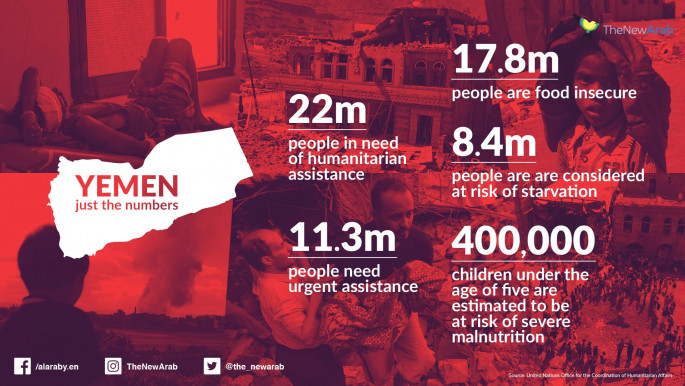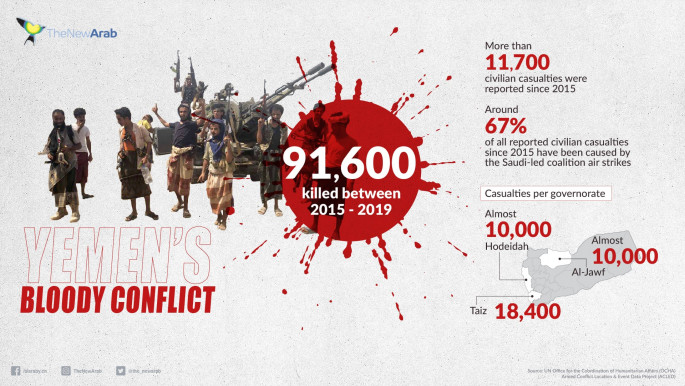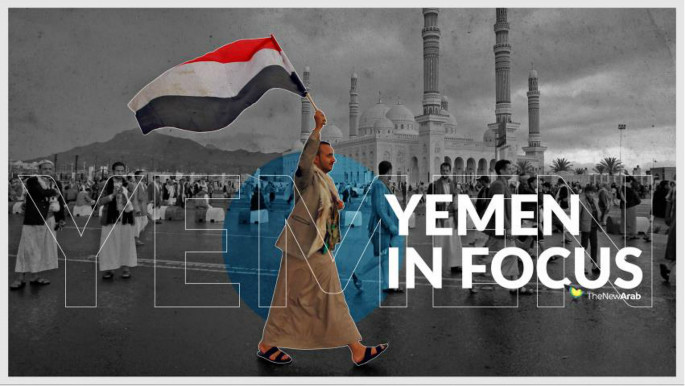Yemen in Focus: Deadly rebel attacks take out UAE's right-hand man in Yemen
This comes only weeks after the UAE said it would withdraw the bulk of its forces from Yemen and rely on the services of the likes of Abu Yamama and his militias.
The separate attacks by the Houthis and jihadists hit UAE-backed security forces in Yemen's second city and temporary capital Aden on Thursday, killing at least 49 people, many of them newly trained police cadets, officials said.
The first attack was a suicide car bombing carried out by jihadists on a police station that killed 13 police officers and wounded several others, a security source said.
But the deadlier, second attack was carried out by the Houthis, who said they launched a drone strike and a ballistic missile at a training camp west of Aden, killing at least 39 people.
The airborne attack hit as senior commanders were overseeing a passing out parade for newly graduated cadets at Al-Jala Camp, 20 kilometres (13 miles) from the centre of Aden.
The missile struck about five metres (yards) from the viewing platform and a senior commander named Abu al-Yamama al-Yaefi was among the dead, an AFP photographer reported.
Abu al-Yamama was one of the UAE's pointmen in Yemen and is accused of enabling its covert operations and notorious detention facilities.
Aden is controlled by Yemen's internationally recognised government and its supporters in the Saudi-led military coalition, which has been fighting the rebels since 2015.
The Houthis claimed responsibility for the drone and missile attack on Al-Jala training camp, while the Islamic State group said it was responsible for the suicide bombing on the police station, in a statement on the Telegram messaging app.
On Thursday, the Yemeni government said the "source and purpose (of the attacks) were the same".
"The two attacks prove the Houthi militia rebels and other terrorist groups are sharing roles and complementing each other in a war against the Yemeni people," a statement said.
The Houthis on Thursday justified the drone and missile attack on the military parade of fresh graduates in Aden's al-Bureiqa district, where the UAE has largely trained government forces since the start of the conflict.
"Air Force Command and missile force targeted a camp of invaders and mercenaries in Aden, killing and wounded dozens," the rebel group said in a tweet.
"The military parade that was targeted in Aden was preparing to march towards Houthi positions in Dalea and Taiz," Houthi Brigadier General Yahya Sari claimed.
Long-range missile
Also on Thursday, Yemen’s Houthis launched a ballistic missile attack on a Saudi military position in the far-eastern Dammam city, the rebels announced, the first such long-range cross-border attack.
“The force launched an advanced long-range ballistic missile towards an important military target deep into Saudi Arabia’s Dammam in a new and practical test of the Yemeni missile force," Houthi Brigadier General Yahya Sari said in a statement.
The attack was a response to Saudi Arabia’s crimes of aggression against the people of Yemen, the Houthi official said, warning foreign companies and citizens to stay away from military positions in the kingdom which he said “have become legitimate targets”.
Dammam is located in the easternmost part of Saudi Arabia and is an essential centre for economic companies including Saudi Aramco, a major oil export hub.
Houthi rebels have increased cross-border attacks on the Saudi kingdom in recent weeks, though Thursday’s attack on Dammam is the first to demonstrate the rebels’ long-range capabilities.
On Sunday, Yemen's Houthi rebels said they launched a drone attack on Saudi Arabia's Abha international airport.
The Houthis said they used Qasif 2 drones in the attack, adding that the strikes were "accurate", Al-Masirah TV reported, citing the group's military spokesman.
Civilian casualty
The attacks came just days after a Saudi-led coalition airstrike hit a crowded market in northern Yemen, killing more than 10 civilians, including children.
They say the strike took place on Monday at the Al Thabet Market in Qataber in Saada province, a stronghold of the rebel Houthi movement which controls most of northern Yemen and is backed by Iran.
The head of the local Al Jumhouri hospital told Reuters 13 people were killed and 23 injured in the strikes.
Speaking to pro-Houthi Al-Masirah TV, the health minister of the Houthis' self-proclaimed government, Taha Mutawakil, said that 10 people were critically injured and that the remains of some of the victims had not yet been identified.
He blamed Saudi Arabia, the UAE, and the United States, which is closely allied with the two Gulf countries, for the massacre.
Just days before the chaos erupted, a senior UN official on Monday appealed for the international community "not to turn its back" on Yemen and to honour its pledges of aid for the impoverished and war-battered country.
"Four years of conflict according to the UNDP latest report have set back Yemen by 20 years," United Nations Development Programme administrator Achim Steiner told AFP in an interview in Amman.
He said the United Nations had received less than 36 percent of the $2.6 billion (2.3 billion euros) pledged at a Geneva conference in February.
"Currently in the next two or three months we can expect that if funding does not materialise, over 21 programmes will have to be rolled back," Steiner added following his first visit to Yemen since taking up his post in 2017.
Tens of thousands of people have died since a Saudi-led coalition intervened in support of the Yemeni government against Houthi rebels in 2015, according to relief agencies.
"It is the worst humanitarian crisis in the world and in some respects it is getting worse because hostilities and fighting still continue and the situation for 20 million or over two thirds of Yemeni citizens require humanitarian support," he said.
"Ten million people currently face the acute risk of famine."
"The world should not turn its back on Yemen," he urged, appealing for "solidarity and generosity" from the international community.
An estimated 24 million Yemenis - more than 80 percent of the population - depend on some form of humanitarian or protection assistance for survival, according to the UN.
The world body has warned that millions of Yemenis are on the verge of famine, while essential health, education and other services have all but collapsed.
Al-Qaeda launches 'opportunistic' attacks
On Friday, at least 19 soldiers were killed when al-Qaeda gunmen stormed Al-Mahfad army base in Abyan province, just a day after deadly assaults by the rebels in Aden.
Al-Qaeda gunmen seem to have taken advantage of what happened Thursdayand launched an assault on Al-Mahfad base and clashed with soldiers, killing at least 19.
Security analyst Aleksandar Mitreski said the attacks "seem opportunistic".
"Al-Qaeda has neither the capability nor the strategic appetite to open a new front in south Yemen," Matreski who is also a researcher at the University of Sydney told AFP.
"We may see other sporadic attacks in the future motivated by al-Qaeda's desire to remain a relevant actor in the Yemeni conflict".
The Yemen-based al-Qaeda in the Arabian Peninsula (AQAP), the Islamic State group and other jihadists have flourished in the chaos of the civil war between the government and Houthi rebels.
The United States considers AQAP the global jihadist network's most dangerous branch and has waged a long-running drone war against its leaders.
Sana Uqba is a journalist at The New Arab.
Follow her on Twitter: @Sanasiino
Yemen In Focus is a new, regular feature from The New Arab.
Click below to see the full archive.





 Follow the Middle East's top stories in English at The New Arab on Google News
Follow the Middle East's top stories in English at The New Arab on Google News


